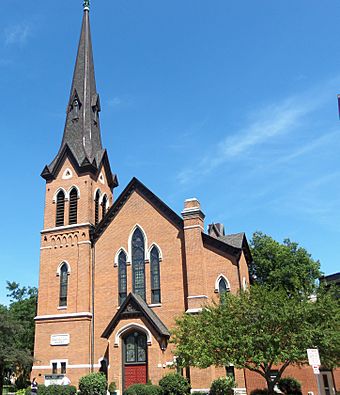Congregational United Church of Christ (Iowa City, Iowa) facts for kids
Quick facts for kids |
|
|
Congregational Church of Iowa City
|
|
|
U.S. Historic district
Contributing property |
|
 |
|
| Location | 30 N. Clinton St. Iowa City, Iowa |
|---|---|
| Built | 1869 |
| Architect | Gurdon P. Randall |
| Architectural style | Gothic Revival |
| Part of | Jefferson Street Historic District (ID04001097) |
| NRHP reference No. | 73000729 |
| Added to NRHP | June 18, 1973 |
The Congregational United Church of Christ is a historic church found in downtown Iowa City, Iowa, in the United States. It's located close to the University of Iowa. This church group started in 1856. The church building itself was added to the National Register of Historic Places in 1973, which means it's recognized as an important historical site. Later, in 2004, it became part of the Jefferson Street Historic District, a special area with many important buildings.
Contents
History of the Church
How the Church Started
Seventeen people officially signed up to start the church group in 1856. A famous architect from Chicago, Gurdon P. Randall, designed the church building you see today. The first stone, called a cornerstone, was placed in 1868.
The church cost $30,000 to build, which was a lot of money back then! It was officially opened on December 9, 1869.
Changes Over the Years
In 1891, a parsonage (a house for the church's minister) was built next to the church. This building was later sold to the university and is now where the biology building stands.
A large Lyon and Healy organ was put into the church in 1903. More parts were added to the church later. An administration building was built in 1924, and a smaller "Little Chapel" was added in 1940.
Joining the United Church of Christ
In 1957, the Congregational Church and the Evangelical and Reformed Church joined together. They formed a new church group called the United Church of Christ. The Iowa City congregation became part of this new church at that time.
In the same year, a new Wicks organ was installed. Also, a Christian Education building was added to the church property.
Modern Updates and Renovations
The church building had some big updates in 1969. A new entrance was made on the ground floor. The social hall, where people gather, was improved. The choir loft and the chancel (the area around the altar) were also updated.
In 1986, the main worship area, called the sanctuary, was made accessible for people with disabilities. It was updated again in 2002 to keep it looking good and working well.
The Special Pipe Organ
In 2007, a special pipe organ was given to the church by someone who wished to remain anonymous. This organ, called the Casavant Frères, Opus 3867, is very unique. It uses parts from the church's older organs.
The bottom part of its wooden frame comes from the 1903 Lyon and Healy organ. The top part, with its fancy Gothic designs, was from updates made in 1934. Seven parts of the 1958 Wicks organ are also included in this new organ. It has 29 different sets of pipes in total!
Church Architecture
Gothic Revival Style
The church building is made of brick and is built in the Gothic Revival style. This style often looks like old European cathedrals. It has a tall, square tower on one corner. The front of the building, called the facade, is not perfectly even on both sides.
There's also a small tower at the back. This tower was once part of the church's heating and ventilation system. A small, round tower, or turret, on the opposite side of the main tower used to have a pointy top called a pinnacle.
Windows and Interior Design
In 1969, a small entrance area, or vestibule, was added to the front of the building. Above this entrance are three tall, narrow windows called lancet windows. You can see the same type of windows along the side walls of the church.
The main worship area, the sanctuary, is located above a raised basement. In 1934, the inside of the church was updated. The ceiling, which used to be plain, was given Gothic-style beams. This made the inside look more grand and matched the outside style.



